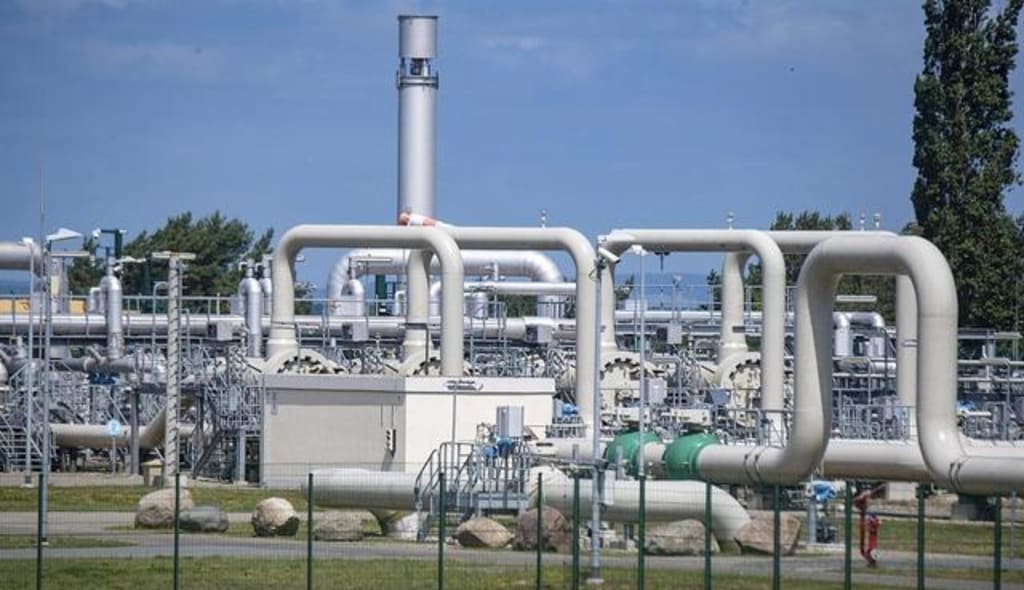EU belt tightening: reduce natural gas usage by 15%! This is enough for Russia
To reduce natural gas usage by 15%! This is enough for Russia

As Russia cut the natural gas transportation volume of "Nord Stream 1" again, European natural gas prices soared again, ushering in the most severe "energy crisis" this year.
(The gas supply of Beixi No. 1 has been "halved" again, from 40% of full load to 20%)
A few days ago, the natural gas delivery futures contract for next month related to the European benchmark wholesale natural gas price TTF soared by 20%, and the price has exceeded 210 euros / MWh, the highest price since early April this year. If Russia continues to "stuck in the European gas pipeline", the price of natural gas in Europe will continue to rise in the future.
(European natural gas prices are rising steadily and are approaching the peak in March, data source FT)
Gazprom announced that it will continue to reduce the flow of natural gas at Nord Stream 1 from Wednesday (July 27) due to turbine maintenance problems, the flow will be reduced to 33 million cubic meters, half the previous flow, the largest pipeline 20% of the delivery volume (full-load gas delivery volume is 167 million cubic meters).
(Russia's natural gas exports to the EU have fallen to a staged bottom)
Before that, the Nord Stream 1 project finally obtained the turbines that had been detained by Canada for a long time, and briefly restored the production capacity to 40%, which eased the upward trend of European natural gas prices a little, but soon Russian President Vladimir Putin cashed in. He followed up his warning to the EU that gas supplies have fallen sharply again.
European countries have expressed strong condemnation of Russia's "injustice", believing that this move by the Kremlin is "weaponizing" the supply of gas to Europe, or "natural gas blackmail".
But obviously European countries do not have the qualifications to accuse Russia in this way. You must know that the "sanctions sticks" in Europe and the United States are still waving to Russia, and NATO weapons are still being continuously delivered to Ukraine, making the prospect of Russia-Ukraine conflict even more unpredictable. It is clear that Europe and the United States do not want the war to subside, and how can the coping strategies that Russia was forced to make count as "extortion"? Only the EU is allowed to sanction Russia, and Russia is not allowed to "kill" the EU? There is no such thing in the world.
Europe wants cheap and abundant Gazprom. It's very simple. Stop sanctions, end the interference in the situation in Ukraine, and everything will return to the way it was. But it depends on the European countries, whether they have the courage to make a decision (the whip of the United States is whipping behind, basically there is no such possibility).
(It seems simple to solve the natural gas problem, but it is difficult for EU countries without military autonomy to make decisions that go against the will of the United States)
The EU's sanctions have been round after round, endlessly, and now the seventh round has begun after six rounds! This time, it is clear that Russia intends to be tough with the EU. If this "lack of gas" situation continues into this winter, with the current gas storage and usage in the EU, there is absolutely no possibility to survive the winter safely. But the EU, which knows it should do something, has "no cards to play" in its hands, so it can only resort to the "last resort" that has been unwilling to use, that is, "tighten the belt"-reduce its own gas consumption.
(Russia: Don't worry, more difficult days are yet to come~)
On the 26th, the EU voted to pass the latest plan to reduce the use of natural gas, and the member states reached an agreement that they will "voluntarily" Reduce natural gas usage by 15%. In response to this plan, only one country, Hungary, voted against it. The foreign minister of the country visited Russia just last week and asked Russia to increase gas supplies to Hungary.
(Although the EU has passed a plan to reduce gas use, there is disagreement within the EU)
It is reported that the 15% standard is compared with the average level of the past 5 years, so according to past data estimates, if the EU can really reduce the use of natural gas by 15%, it can save 45 billion cubic meters. For the natural gas reserves, it can only be said that the EU and other countries can only live by "tightening their belts" this winter. For example, to ensure the stable use of electricity, heating, important enterprises and factories, and want to use gas as recklessly as in the past, it is impossible.
How to reduce natural gas usage by 15%? The EU will implement it through a two-step approach. First, member states need to formulate their own plans to reduce domestic gas demand; if a country does not implement this plan and uses excess gas, the European Commission will implement mandatory rationing for it. That is to intervene in the transmission of natural gas within the Union. This act of directly taking away the sovereign power of various countries has always been the most controversial method within the EU. This shows how anxious the EU is about gas use today.
(The European Union’s choice to reduce natural gas usage by 15% can only be said to be a step-by-step approach, addressing the symptoms but not the root cause, and harming the interests of its citizens and businesses)
Although only one country, Hungary, is opposed to it, the plan to reduce gas consumption has caused divisions within the EU to deal with the shortage of natural gas. On the one hand, countries that use less gas in winter, or have North African natural gas pipelines that replace Nord Stream 1, are not happy to see gas consumption cut down. Most of these countries are southern European countries, such as Spain, Portugal, Greece and other countries. Poland has one of the best gas storage in Europe.
On the other hand, there are countries that strongly demand the reduction of gas consumption. Most of these countries are Western European and Northern European countries, which are heavily dependent on Russia's natural gas supply, such as Germany, the Netherlands, Denmark and other countries. These countries have come forward to criticize the southern European countries. "Undermining the unity of the EU" should be based on the interests of the Union.
(Russia has further reduced its natural gas exports to Europe, making it difficult for European countries to store enough natural gas before winter comes)
Although the EU has finally reached a "consensus" on this issue, a rift has developed between northern and southern Nordic countries that may not be erased for a long time.
About the Creator
sayre laylah
Tired of monotonous climbing moves, but every step is close to the top
Enjoyed the story? Support the Creator.
Subscribe for free to receive all their stories in your feed. You could also pledge your support or give them a one-off tip, letting them know you appreciate their work.






Comments
There are no comments for this story
Be the first to respond and start the conversation.